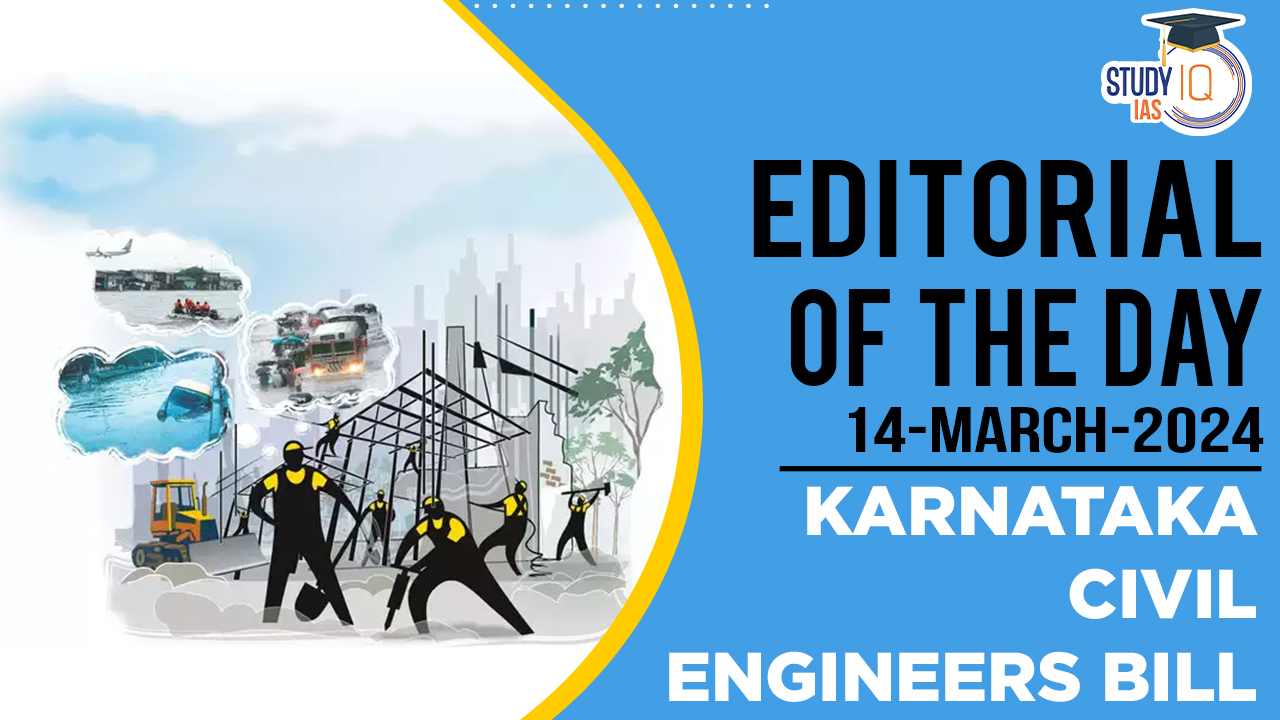Table of Contents
Context: Recently, the Karnataka government passed the Karnataka Professional Civil Engineers Bill, 2024 to allow only registered engineers to approve building plans ensuring that they will be accountable for any eventualities.
Overview of the Karnataka Professional Civil Engineers Bill
- Purpose: Improve professionalisation and construction standards in Karnataka.
- Requirement: Only certified civil engineers can offer engineering designs.
- Qualifications for Certification:
- Diploma or degree in civil engineering.
- Registration with the Karnataka Council of Professional Civil Engineers within one year of the Act’s commencement.
- Experience requirement: one year for degree holders, two years for diploma holders.
Key Provisions and Restrictions of Karnataka Civil Engineers Bill
- Scope of Engineering Design Services: Only professional civil engineers can provide engineering design services. This encompasses a wide range of services including civil, structural, geotechnical, and environmental engineering designs and drawings.
- The services also cover conceptual plans, master plans, layout plans, and other designs and drawings for buildings and infrastructure.
- Project-Specific Restrictions: The Bill stipulates that any construction project exceeding 50 square metres in plinth area, taller than a ground floor, not built with a load-bearing masonry structure (i.e., buildings that require columns and beams), or any group housing project with more than three buildings, must be supervised, executed, or certified exclusively by professional civil engineers.
- Government Gatekeeping: The Bill mandates that government authorities must not issue construction permits unless the designs and drawings are certified by registered professional civil engineers. This provision is intended to ensure that all construction adheres to professional standards for safety, durability, and design integrity.
We’re now on WhatsApp. Click to Join
Criticisms and Concerns of the Karnataka Civil Engineers Bill
Restrictive and Impractical Measures
- Exclusivity: Bill restricts engineering designs to certified civil engineers, limiting contributions from other qualified professionals in construction (architects, structural engineers).
- Implementation Challenges: Stringent regulations might delay approvals, increase costs due to limited certified professionals, and hinder innovation.
- Against Precedents: Supreme Court previously allowed overlapping services in architecture, suggesting a similar approach for civil engineering.
| Comparison with Gujarat Act |
|
Global Practices and Regulatory Issues
- Self-Regulation: Professional bodies govern members through codes, standards, and continuing education.
- Promotes high standards while adapting to new technologies.
- Title Protection: Protects titles like “Chartered Engineer” based on qualifications.
- Allows others to offer similar services without holding the title.
- Acknowledges competency without service monopoly.
- Economic Considerations: Strict regulations might not guarantee economic benefits.
- Overly restrictive practices can:
- Limit competition and innovation.
- Increase service costs for consumers.
- Overly restrictive practices can:
Alternative Regulatory Approaches
- Licencing: Reserved for high-risk activities (e.g., earthquake zones).
- Targets crucial areas requiring specialised expertise.
- Continuing Education: Professional bodies mandate ongoing learning for licence/certificate maintenance.
- Ensures professionals stay updated with advancements.
International Examples
- UK Engineering Council: Sets standards but doesn’t restrict practice to licensed individuals.
- Protects titles like “Chartered Engineer.”
- UK Architects Registration Board: Protects the “Architect” title but allows others to do architectural work.
Recommendations for Improvement
- Rigorous Certification Process: Enhance certification requirements, possibly including examinations and more stringent experience prerequisites.
- Flexible Service Offerings: Consider allowing related professionals to offer overlapping services, recognizing the complexity of construction projects.
- Title Protection over Service Monopoly: Focus on protecting professional titles to assure competence without restricting the range of professionals who can contribute to construction projects.


 List of Military Exercises of India 2024...
List of Military Exercises of India 2024...
 GPS Spoofing and Its Impact in India: A ...
GPS Spoofing and Its Impact in India: A ...
 Amrit Gyaan Kosh Portal: A Comprehensive...
Amrit Gyaan Kosh Portal: A Comprehensive...





















